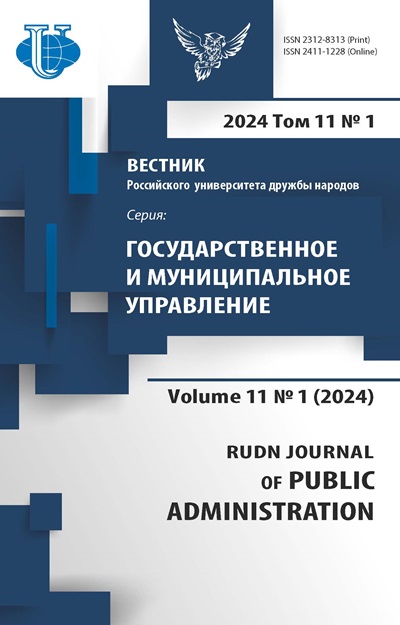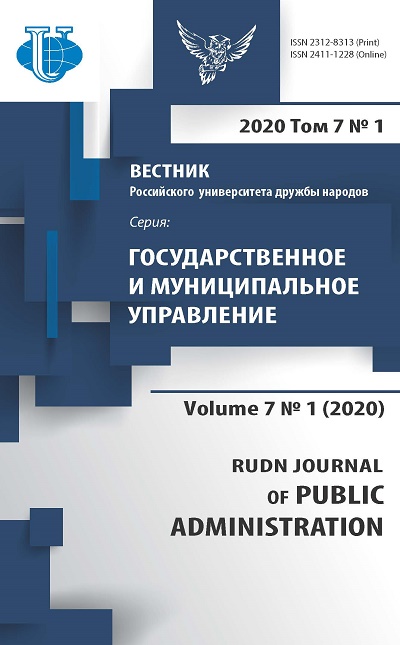Perception of the Memorial Conflict around the Film “The Death of Stalin” among Russian Internet Users
- Authors: Belov S.I.1,2,3
-
Affiliations:
- Moscow State University
- Saint Petersburg State University
- Institute of Philosophy of the Russian Academy of Sciences
- Issue: Vol 7, No 1 (2020)
- Pages: 36-46
- Section: CURRENT PROBLEMS OF PUBLIC ADMINISTRATION
- URL: https://journals.rudn.ru/public-administration/article/view/23795
- DOI: https://doi.org/10.22363/2312-8313-2020-7-1-36-46
Cite item
Full Text
Abstract
The presented study is devoted to the problem of perception of the conflict around the film “Death of Stalin” among Russian Internet users. The article is based on materials from the cybermetric study conducted through the social media monitoring service IQBuzz. The methodological basis of the work is formed by cybermetric methods combined with elements of traditional content analysis and descriptive analysis. The survey showed that Russian Internet users perceived the film “Stalin’s Death” mostly negatively. Support for the release of the movie is detected in only 25% of the messages included in the sample. Support of the movie by users was mostly not politically motivated. Russian authorities didn’t find support from the users for the film’s rental license. In their opinion, the scandal associated with the revocation of the film’s film license provoked increase of interest. Both opponents and apologists of the film agreed that the Ministry of Culture of the Russian Federation paid too much attention to this problem, distracting from the solution of the more significant tasks facing the department. The actions of officials were considered as an attempt to restrict freedom of speech. The reason for criticism was also inconsistency in the actions of government officials. The state opposed the release of the anti-Soviet film in terms of content, while Russian films, created in a similar ideological vein, are supported by the authorities.
Keywords
About the authors
Sergey I. Belov
Moscow State University; Saint Petersburg State University; Institute of Philosophy of the Russian Academy of Sciences
Author for correspondence.
Email: Belov2006s@yandex.ru
Associate Professor of the Department of Russian Politics, Moscow State University (Russian Federation); Doctoral Candidate, Institute of Philosophy of the Russian Academy of Sciences (Russian Federation); Grant Contractor, Russian Foundation for Basic Research No 18-18-00233, Saint Petersburg State University
Leninskiye Gory str., 1, Moscow, Russian Federation, 119991; University Embankment, 7/9, St Petersburg, Russian Federation, 199034; Goncharnaya str., 12,1, Moscow, Russian Federation, 109240References
- Belov S.I. Nedostatki formirovanija politiki pamjati v Rossii (rezul’taty obobshhenija jekspertnyh mnenij) [Disadvantages of the Formation of the Memory Policy in Russia (the Results of the Generalization of Expert Opinions)]. RUDN Journal of Political Science. 2018; 20 (2): 269–277 (In Russ.).
- Evgen’eva T.V., Selezneva A.V. Sovetskoe proshloe v cennostnom i obrazno–simvolicheskom prostranstve rossijskoj identichnosti [The Soviet Past in the Value and Figurative – symbolic Space of Russian Identity]. Polis. Political Studies. 2016; 3: 25–39 (In Russ.).
- Voditel’ «UAZ» szheg kinoteatr v Ekaterinburge iz-za fil’ma «Matil’da». Mehr goroda Evgenij Rojzman nazval proizoshedshee teraktom [The UAZ Driver Burned Down a Movie Theater in Yekaterinburg because of the Movie “Matilda”. The Mayor of the City Yevgeny Roizman Called the Incident a Terrorist Attack]. MK. 09.04.2017. URL: https://www.mk.ru/incident/2017/09/04/voditel-uaz-szheg-kinoteatr-v-ekaterinburge-izza-filma-matilda.html. Accessed: 08.09.2018 (In Russ.).
- Klyuchnikova T.N., Isaeva E.Yu. Historical Memory of the Great Patriotic War as a Process of Forming the Civic Identity of Young People [Istoricheskaja pamjat’ o Velikoj Otechestvennoj vojne kak process formirovanija grazhdanskoj identichnosti molodezhi]. Obrazovanie i obshchestvo. 2014; 87 (4): 65–69 (In Russ.).
- Korshunova O.N., Polivanov Ya.M. Istoricheskaja pamjat’ o mirovyh vojnah kak problema konfliktologii [Historical Memory of World Wars as a Problem of Conflictology]. Konfliktologiya. 2014; 3: 39–50 (In Russ.).
- Nemirova N.V. Istoricheskaja pamjat’ o Velikoj Otechestvennoj vojne: opyt kachestvennogo sociologicheskogo issledovanija [Historical Memory of the Great Patriotic War: The Experience of Qualitative Sociological Research]. Uchenye zapiski Zabajkal’skogo gosudarstvennogo universiteta. Seriya: Sociologicheskie nauki. 2015; 4 (63): 157–165 (In Russ.).
- Malinova O.Yu. Oficial’nyj istoricheskij narrativ kak jelement politiki identichnosti v Rossii: ot 1990‑h k 2010‑m godam [The Official Historical Narrative as an Element of the Identity Policy in Russia: From the 1990s to the 2010s]. Polis. Political Studies. 2016; 6: 139–158 (In Russ.).
- Nikol’skaya A.M. Pamjat’ o velikoj vojne [The Memory of the Great War]. Pro nunc. Sovremennye politicheskie processy. 2013; 1 (12): 32–35 (In Russ.).
- Prokazina N.V., Staryh N.P. Kommunikativnaja pamjat’ o Velikoj Otechestvennoj vojne: teoreticheskie podhody i social’naja praktika [Communicative Memory of the Great Patriotic War: Theoretical Approaches and Social Practice]. Srednerusskij vestnik obshchestvennyh nauk. 2014; 5 (35): 35–43 (In Russ.).
- Semchenkov A.S. Istoricheskaya pamyat’ o Velikoj Otechestvennoj vojne i obespechenie politicheskoj stabil’nosti Rossii [Historical Memory of the Great Patriotic War and Ensuring Political Stability in Russia]. Vestnik Rossijskoj nacii. 2015; 3 (41): 16–27 (In Russ.).
- Ironija istorii, ili mozhno li smejat’sja nad smert’ju Stalina? [The Irony of History, or Is It Possible to Laugh at Stalin’s Death?]. WCIOM. 19.02.2018. URL: https://infographics.wciom.ru/theme-archive/society/religion-lifestyle/past-future/article/ ironija-istorii-ili-mozhno-li-smejatsja-nad-smertju-stal.html. Accessed: 08.10.2019 (In Russ.).
















